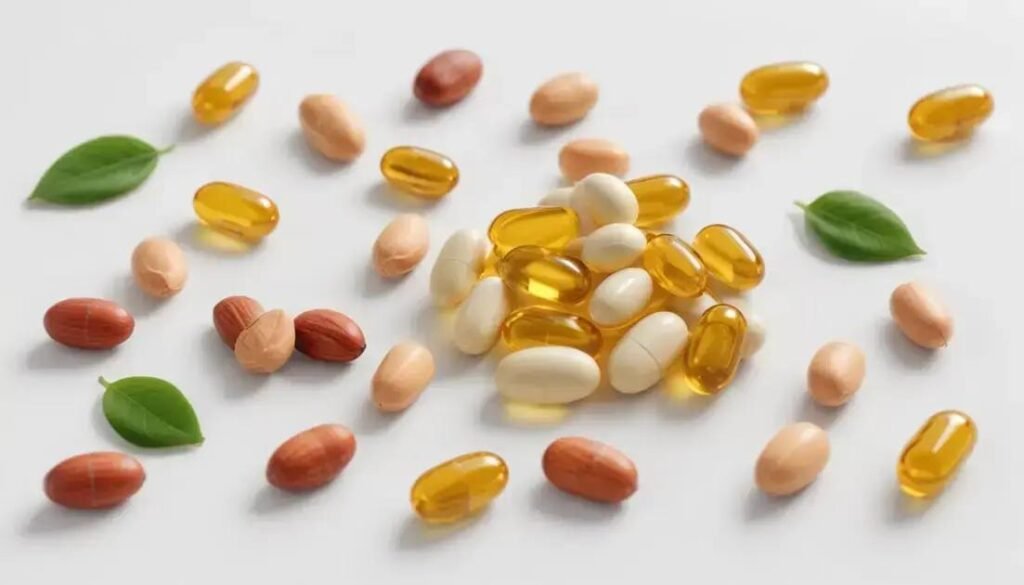THE vitamin E is a powerful antioxidant which acts to protect cells against free radicals, strengthens the immune system and contributes to the skin health, eyes and heart. Present in various foods and also available in the form of supplement, this nutrient can be essential for the body's balance and the prevention of nutritional disorders. In this article, you will discover What are the benefits of vitamin E?, how to avoid deficiency and when to consider supplementation.
Summary
Explanatory video about the benefits of Vitamin E:
What is vitamin E and what is it for?
THE vitamin E is a fat-soluble vitamin, that is, it is absorbed along with fats and stored in the body's adipose tissue. Its best-known role is antioxidant action, fighting the free radicals and helping to prevent premature aging and degenerative diseases.
She is also involved in cell regeneration, strengthening of the immune system, maintenance of skin health and eye protection. Additionally, studies associate vitamin E with a reduced risk of Alzheimer's disease and cardiovascular problems.
What are the health benefits of vitamin E?
You benefits of vitamin E include:

- Antioxidant action that protects cells from damage
- Improvement of skin health and healing
- Strengthening of immune system
- Support for cardiovascular health
- Reduction of risk of heart disease and prostate cancer
- Contribution to the muscle health and the eyes
These effects make vitamin E one of the nutrients most important for the health maintenance at all stages of life.
What are the signs of vitamin E deficiency?
Although uncommon, the vitamin E deficiency can occur in people with poor fat absorption or extremely restrictive diets. The main signs include:
- Muscle weakness
- Vision problems
- Drop in immunity
- Difficulties with motor coordination
- Weakening of cells immunological
THE vitamin E deficiency is more common in people with chronic bowel disorders, such as celiac disease or cystic fibrosis.
What foods are rich in vitamin E?
Among the main foods rich in vitamin E, the following stand out:
- Oilseeds: almonds, hazelnuts, chestnuts
- Vegetable oils: sunflower oil, wheat germ oil
- Green vegetables: spinach, kale, broccoli
- Avocado
- Seeds: sunflower, pumpkin
These foods should be part of a balanced diet to ensure the recommended daily consumption of this essential nutrient.
When to take vitamin E supplements?
THE vitamin E supplementation is indicated in cases of proven disability, poor fat absorption or for specific groups, such as pregnant women, the elderly and people with degenerative diseases. The vitamin E supplement should always be used under the guidance of a doctor or nutritionist, avoiding excessive use.

THE take the supplement without recommendation can lead to the accumulation of the vitamin in the body, as it is fat soluble and is not easily eliminated.
What are the risks of excess vitamin E?
THE excess vitamin E can cause side effects, such as:
- Higher risk of bleedings, especially in people using blood thinners
- Nausea and gastrointestinal discomfort
- Headaches
- Fatigue
High doses of vitamin And they were also associated with an increased risk of Hemorrhagic stroke. Therefore, the dose recommended daily dose (about 15 mg for adults) should be respected.
Is vitamin E an antioxidant? How does it work in the body?
Yes, the vitamin E is an antioxidant powerful. Its main function is protect cells against the stress oxidative caused by the free radicals. This protection helps preserve cellular integrity, delay aging and prevent diseases such as Cancer and Alzheimer.

The most active form of vitamin E in the body is alpha-tocopherol, being he the main antioxidant fat-soluble present in blood plasma.
Does vitamin E help improve skin and hair?
Yes, vitamin E has visible effects on skin health and hair. Its power moisturizer and healing improves the skin elasticity, combat the premature aging and promotes cell regeneration. In hair, it helps to reduce the fall and stimulates growth by improve circulation on the scalp.
Many cosmetics and food supplements use vitamin E because of its aesthetic benefits.
For which groups is Vitamin E indicated?
THE vitamin E is indicated to:
- People with low intake of good fats
- Elderly
- People with nutritional disorders or digestives
- Pregnant and lactating women (with guidance)
- Individuals with a family history of heart disease
In these groups, the supplementation may be useful for increase resistance and prevent health problems.
How can vitamin E help during pregnancy?
During pregnancy, vitamin E plays a crucial role in the healthy development of the fetus. This nutrient is essential for the proper formation of fetal organs and tissues, especially the lungs and nervous system, ensuring healthy growth. In addition, vitamin E helps protect the baby's cells from oxidative damage.

In pregnant women, vitamin E also helps to improve the immune system, strengthening immunity during this important period. It can help reduce inflammation, ensuring that the mother's body is better able to cope with the natural changes of pregnancy.
Foods rich in vitamin E, such as avocado, almonds and spinach, can be incorporated into the diet in a balanced and safe way, always under medical supervision. This way, it is possible to take advantage of all the benefits of this vitamin for the health of the mother and baby.
What is the recommended amount of vitamin E per day?
THE vitamin E intake recommended for adults is 15 mg per day. This amount can be obtained through a diet rich in foods that contain vitamin E, especially vegetable oils, oilseeds and green leaves.
THE vitamin E is better absorbed when taken together with healthy fats. Therefore, consuming these foods with olive oil, avocado or nuts can enhance the benefits.
👉 Vitamin E is just one of several that play fundamental roles in the body. If you want to better understand how vitamins and supplements affect your health, check out our complete guide to dietary supplements and discover how to create a smarter, more balanced nutritional routine.
Conclusion: what are the benefits of vitamin E?
THE vitamin E is a essential nutrient that acts in cell protection, improves the functioning of the immune system, prevents degenerative diseases and promotes the skin and hair health.
Although it is easily found in food, vitamin supplementation And it can be indicated in specific cases, always with the supervision of a professional. Avoid high doses of vitamin And without need it is essential to prevent adverse effects.
With balance, it is possible to obtain all the benefits of vitamin E and strengthen your health naturally.
Key points about vitamin E:
- THE vitamin E is a powerful antioxidant that protects the cells
- It is present in foods such as oilseeds, vegetable oils and green leaves
- Improves the health of your skin, eyes, heart and immune system
- Vitamin supplementation And it should only be done with supervision.
- High doses may cause side effects
FAQ – Frequently Asked Questions about Vitamin E
What are the benefits of vitamin E?
It acts as an antioxidant, protects cells, improves immunity, benefits the skin and prevents cardiovascular diseases.
What is the recommended daily dose?
The recommendation for adults is 15 mg per day, which can be achieved with a balanced diet.
What foods are rich in vitamin E?
Almonds, sunflower seeds, avocado, spinach, vegetable oils and nuts.
Is vitamin E supplement harmful?
When taken in excess, yes. It can increase the risk of bleeding and cause nausea or headache.
Does vitamin E help fight aging?
Yes, its antioxidant action protects the skin and delays signs of aging.
Who should take vitamin E capsules?
People with proven disabilities or special needs, always with medical or nutritionist guidance.
Does vitamin E help hair?
Yes, it can stimulate growth, strengthen hair strands and improve scalp health.



